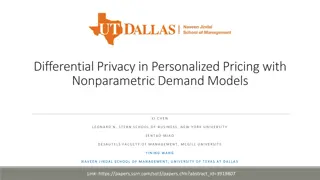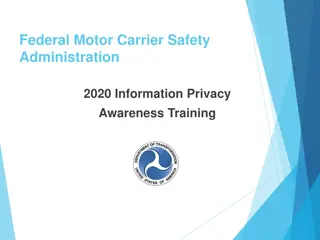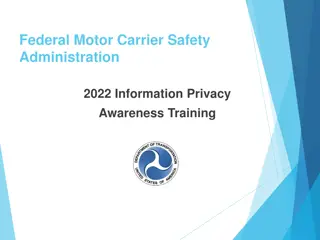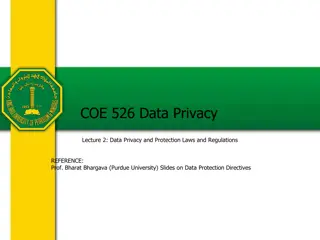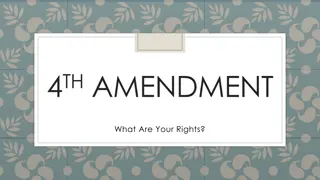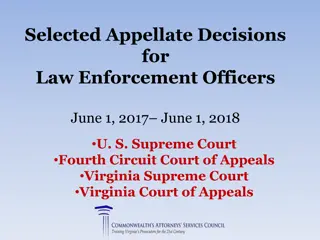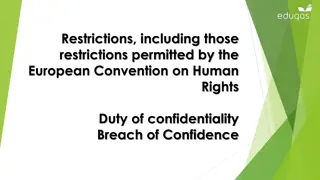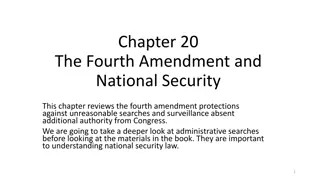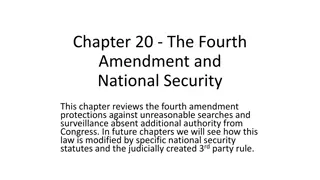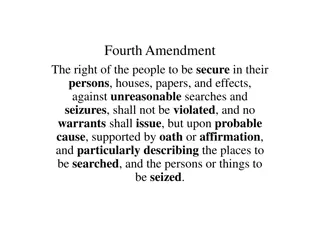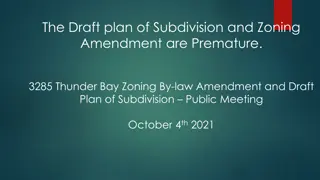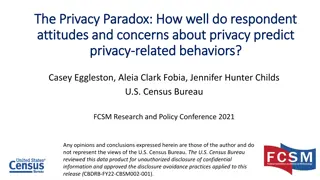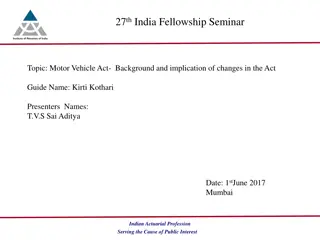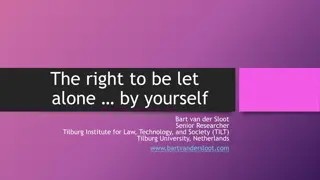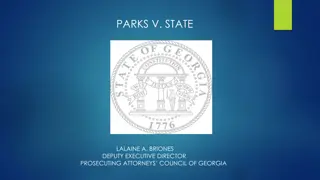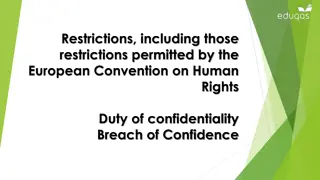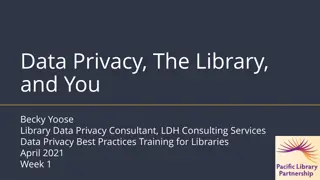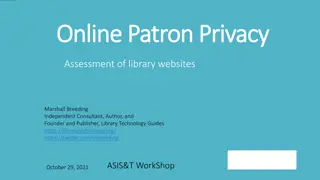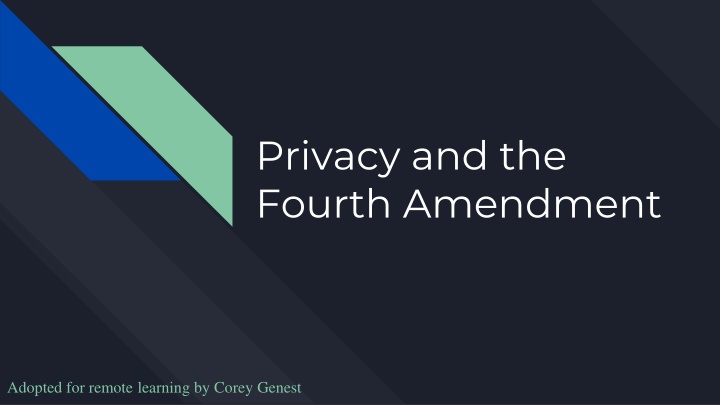
Privacy and Countervailing Interest
Dive into the concept of privacy, countervailing interest, and their implications on government intervention. Explore various perspectives on privacy and its evolving nature in the digital age.
Download Presentation

Please find below an Image/Link to download the presentation.
The content on the website is provided AS IS for your information and personal use only. It may not be sold, licensed, or shared on other websites without obtaining consent from the author. If you encounter any issues during the download, it is possible that the publisher has removed the file from their server.
You are allowed to download the files provided on this website for personal or commercial use, subject to the condition that they are used lawfully. All files are the property of their respective owners.
The content on the website is provided AS IS for your information and personal use only. It may not be sold, licensed, or shared on other websites without obtaining consent from the author.
E N D
Presentation Transcript
Privacy and the Fourth Amendment Adopted for remote learning by Corey Genest
What does the term privacy mean to you? Below, please list your thoughts and write a rough definition. [type here]
What things, or places, in your life do you consider to be private? Please list them below: [type here] [type here} [type here] [type here] [type here] [type here] [type here] [type here]
How would you categorize the various types of privacy you listed on the previous page? List the categories below (eg: private information, private places, etc) [type here]
Countervailing Interest An interest that counterbalances, counteracts or offsets another interest. For example, while the First Amendment appears to protect the act of yelling fire in a crowded movie theater when there is no fire, the government has a countervailing interest in protecting public safety by prohibiting false statements that put people in immediate danger. Protecting public safety is the countervailing interest to protecting free speech.
Based on the definition of countervailing interest, when it is acceptable for the government to invade your privacy? [type your thoughts here]
Interview and Conversation Choose one or more people in your home and have a conversation about privacy. You can use the following questions to help guide your discussion. On the next slide, please provide brief answers to these questions. Is there anything that you consider private that someone else does not? Is there anything that someone else considered private that you do not? Why do you think those differences exist? Do you think that your definition of privacy is the same as your parents? Your grandparents? Why or why not? Why do you think people have different perspectives on what they consider private? What factors may affect how a person views privacy? Where did your opinion on privacy come from - in other words, from whom and when did you learn what was considered private? Why do people disagree about when it is acceptable for the government to invade a person's privacy? How has technological advancement made this a more important question today than it has been in the past?
[type here] In the space above, please provide a short synopsis of your interview/conversation from home.
Constitutionally Speaking - Reasonable Expectations - 1 Suffolk Law Professor Jessica Silbey discusses the three areas of privacy that are afforded varying degrees of constitutional protection: bodily, spatial, and informational. Constitutionally Speaking Reasonable Expectation of Privacy
On the following pages, please answer the questions about Professor Silbey s presentation.
According to Professor Silbey, some people believe that privacy was the "impetus behind the Bill of Rights." Impetus can be defined as the force that causes something to occur. Based on what you know about American history and the Bill of Rights, do you agree or disagree with her statement? Why? [type here]
Reread the quote that was referenced in the video: Instantaneous photographs and newspaper enterprises have invaded the sacred precincts of private and domestic life, and numerous mechanical devices threaten to make good the prediction that 'what is whispered in the closet shall be proclaimed from the house-tops'. On Privacy. Louis Brandeis and Samuel Warren. 4 Harvard Law Review (1890). In your opinion, has the prediction made by Brandeis and Warren come true? Does the combination of technology and the news media threaten to destroy the idea of privacy as we know it? Why or why not? [type here]
Three types of privacy are defined in the video. Identify and give examples of each type of privacy.
Professor Silbey ended her lecture with the following statement: ...our reasonable expectations are evolving with the times and privacy is measured in part by what we do and what we expect. a) How are "our reasonable expectations [of privacy] evolving with the times"? Describe a few examples in your response. b) Explain what you think Professor Silbey meant when she said "...privacy is measured in part by what we do and what we expect." [type here]
Explicit vs Implicit Rights Explicit Implicit A right created by direct, specific statements. A right created not by direct, specific statements, but by language that implies or indirectly suggests it exists. While the right of privacy may be a constitutional right recognized by the courts, nowhere does the U.S. Constitution explicitly state that this right exists.
Please review the Bill of Rights at this link. Identify instances where a right to privacy is implied and record them below. Amendment # Explanation
Please spend some time reading through these SCOTUS cases that deal with privacy. Afterward, please answer the questions. Right of Privacy in General Meyer v. Nebraska (1923) Olmstead v. United States (1928) Griswold v. Connecticut (1965) Katz v. United States (1967) Loving v. Virginia (1967) Stanley v. Georgia (1969) Roe v. Wade (1972) Moore v. East Cleveland (1977) Bowers v. Hardwick (1986) Cruzan v. Missouri (1990) Planned Parenthood v. Casey (1992) Washington v. Glucksberg (1997) Lawrence v. Texas (2003) Full Text Summary Summary Full Text Full Text Full Text Full Text Summary Full Text Full Text Summary Summary Full Text Summary Full Text Full Text Summary Summary Summary Summary Full Text Summary Summary Full Text Full Text Summary
(continued) Fourth Amendment Olmstead v. United States (1928) Katz v. United States (1967) United States v. Knotts (1982) United States v. Karo (1984) Kyllo v. United States (2001)** United States v. Jones (2012) ** Full Text Summary Full Text Summary Full Text Summary Summary Summary Full Text Summary Full Text Full Text
[type answer here] Do you believe that the Constitution should be interpreted based only on what is explicitly stated within it? Or, should the courts be permitted to conclude that in addition to the explicit statements there are implicit understandings that are a part of the Constitution?
[type answer here] Did the Supreme Court emphasize certain Amendments more than others in these right of privacy cases? If so, why do you think that is?
[type answer here] How has the Supreme Court's view on privacy changed over time? Are there specific events in American history and/or cultural changes that you believe may have contributed to the Court's decisions? Explain.
How has technology affected privacy throughout American history?
On the left, please make a list of things that we consider private today that did not exist at the founding of our country. On the right, make a list of the ways government can search today that did not exist back then. [type here] [type here]
Questions to ponder... 1. What are the differences between what was considered private in colonial times and what is considered private today? Why do those differences exist? What are the differences between the search technology available to the government in colonial times and the search technology available today? What major technological innovations have improved (or hindered) the government's ability to search for evidence? How would your privacy be affected today if the Constitution only protected things considered private in colonial times? How would the government's ability to search be affected today if the Constitution only permitted the use of the search technology available in colonial times? 2. 3. 4. 5.
The Fourth Amendment The right of the people to be secure in their persons, houses, papers, and effects, against unreasonable searches and seizures, shall not be violated, and no Warrants shall issue, but upon probable cause, supported by Oath or affirmation, and particularly describing the place to be searched, and the persons or things to be seized.
So... What does the Fourth Amendment mean?
What types of privacy does the Fourth Amendment explicitly protect? What types of privacy do you think are implicitly protected? Why? [type answer here]
Are there times when the government should not have to obtain a warrant to invade your privacy? Why or why not? If so, what countervailing interest(s) outweighs the extra privacy protection provided by the warrant procedure? [type answer here]
Constitutionally Speaking - Your House is Your Castle Retired N.H. Supreme Court Justice James Duggan traces the evolution of the Fourth Amendment definition of "search," and how advances in technology have affected the constitutional prohibition against unreasonable search and seizure. Your house is your castle.
What was the legal definition of a search under the Fourth Amendment from the 1930s through the 1950s? [type answer here]
What was the new standard established by the Supreme Court in Katz v. U.S. (1967) for deciding if a search had occurred? [type answer here]
Provide examples of types of legal and illegal searches under the standard established in Katz v. U.S. (1967). [type answer here]
Describe the facts of U.S. v. Jones. What government action did Jones challenge as an unconstitutional search? What was unexpected about the Supreme Court s reasoning in U.S. v. Jones? [type answer here]
Please choose one of the following options and construct a well supported academic essay. 1. 2. How and why has the constitutional right of privacy changed over time? How and why has the interpretation of the Fourth Amendment changed over time? Does the Supreme Court's current interpretation of the constitutional right of privacy accurately reflect what the average American considers private? Why or why not? Does the Supreme Court's current interpretation of the Fourth Amendment adequately protect your privacy? Why or why not? Is the Supreme Court's current interpretation of the constitutional right of privacy consistent with your own views? Why or why not? 3. 4. 5.

